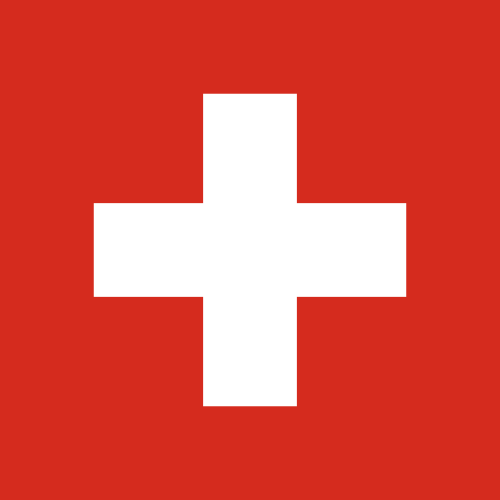List of Public and National holidays for Switzerland in the year 2024
- Neujahr (New Year’s Day): Monday, 1 January 2024
- Berchtoldstag (St. Berchtold’s Day): Tuesday, 2 January 2024
- Heilige Drei Könige (Epiphany): Saturday, 6 January 2024
- Josefstag (St. Joseph’s Day): Tuesday, 19 March 2024
- Karfreitag (Good Friday): Friday, 29 March 2024
- Ostern (Easter Sunday): Sunday, 31 March 2024
- Ostermontag (Easter Monday): Monday, 1 April 2024
- Tag der Arbeit (Labour Day): Wednesday, 1 May 2024
- Auffahrt (Ascension Day): Thursday, 9 May 2024
- Pfingsten (Whitsun): Sunday, 19 May 2024
- Pfingstmontag (Whit Monday): Monday, 20 May 2024
- Fronleichnam (Corpus Christi): Thursday, 30 May 2024
- Nationalfeiertag (Swiss National Day): Thursday, 1 August 2024
- Mariä Himmelfahrt (Assumption of Mary): Thursday, 15 August 2024
- Allerheiligen (All Saints’ Day): Friday, 1 November 2024
- Mariä Empfängnis (Immaculate Conception): Sunday, 8 December 2024
- Weihnachtstag (Christmas Day): Wednesday, 25 December 2024
- Stephanstag (St. Stephen’s Day): Thursday, 26 December 2024

History
- Early History: Inhabited since prehistoric times, Switzerland’s strategic location led to various cultural influences from the Romans, Germanic tribes, and Burgundians.
- Confederation Formation: The Swiss Confederation was formed in 1291 by the three cantons of Uri, Schwyz, and Unterwalden.
- Growth and Neutrality: Expanded through the centuries, maintaining a strong tradition of neutrality, not participating in any foreign wars since 1815.
- Modern Era: Evolved into a federal state in 1848. Remained neutral during both World Wars and joined the United Nations in 2002.
Geography
- Location: Landlocked in Central Europe, bordered by Germany, Austria, Liechtenstein, Italy, and France.
- Landscape: Known for its mountainous terrain, including the Alps and Jura mountains. Also features numerous lakes, the largest being Lake Geneva and Lake Constance.
- Climate: Varied climate from alpine conditions in the mountains to more temperate zones in the plains.
Culture
- Languages: Four official languages: German, French, Italian, and Romansh, reflecting its cultural diversity.
- Arts and Music: Rich cultural heritage in music, fine arts, and literature. Known for traditional folk music, Alpine horn, and yodeling.
- Festivals and Cuisine: Hosts numerous cultural festivals and is renowned for its culinary specialties like Swiss chocolate, cheese fondue, and rösti.
Economy
- Wealth and Innovation: One of the wealthiest and most productive economies in the world. Known for high-quality craftsmanship and innovation.
- Banking and Finance: A global center for banking and finance, renowned for its banking privacy policies.
- Industries: Major industries include pharmaceuticals, chemicals, machinery, and watches. Notable for its high-quality watch brands like Rolex, Patek Philippe, and Omega.
- Trade: Strongly reliant on international trade, with significant exports of machinery, chemicals, and precision instruments.

Politics
- Government Structure: A federal directorial republic with direct democracy practices. Known for its system of direct democracy and frequent referendums.
- Cantonal Autonomy: Comprised of 26 cantons, each with a high degree of autonomy and its own constitution.
- Neutrality and Diplomacy: Maintains a policy of neutrality, not being a member of the European Union, but has numerous bilateral agreements with the EU.
Society
- Population and Languages: A diverse population with a high standard of living. Multilingualism is a key feature of its social fabric.
- Healthcare and Education: High-quality healthcare and educational systems. Home to world-renowned universities and research institutions.
- Social Issues: Challenges include managing immigration, maintaining its cultural identity, and environmental sustainability.
Science and Technology
- Innovation Hub: A leader in scientific research and innovation, particularly in fields like pharmaceuticals, biotechnology, and clean energy.
- Research Institutions: Hosts prestigious research institutions like ETH Zurich and EPFL, and is home to the Large Hadron Collider operated by CERN.
Arts and Literature
- Literary Contributions: Has a rich literary tradition with notable authors like Friedrich Dürrenmatt and Max Frisch. Also a hub for international arts and literature.
- Art and Architecture: Known for its contributions to art history, with renowned museums and galleries, and distinctive Alpine architecture.
Sports
- Alpine Sports: A global hub for skiing, mountaineering, and hiking. Hosts prestigious events like the FIS Ski World Cup.
- Football and Tennis: Also passionate about football and has produced famous tennis players like Roger Federer and Martina Hingis.
International Relations
- Global Diplomacy: Active in international diplomacy, hosting international organizations like the United Nations and the Red Cross in Geneva.
- Humanitarian Tradition: Known for its humanitarian tradition, commitment to global peace, and hosting diplomatic negotiations.
Challenges and Prospects
- Economic Stability: Balancing its economic interests with global changes, including financial sector reforms and trade relations.
- Environmental Policies: Committed to environmental protection, facing challenges related to climate change and sustainable development.
- Social Harmony: Continuing to integrate its multicultural population while maintaining social harmony and direct democratic practices.
In summary, Switzerland is a country known for its political neutrality, direct democracy, cultural diversity, and strong economy. It plays a significant role in international diplomacy and finance, and its commitment to innovation, education, and quality of life make it a unique and influential player on the global stage.
Public Holidays Europe (EMEA)
